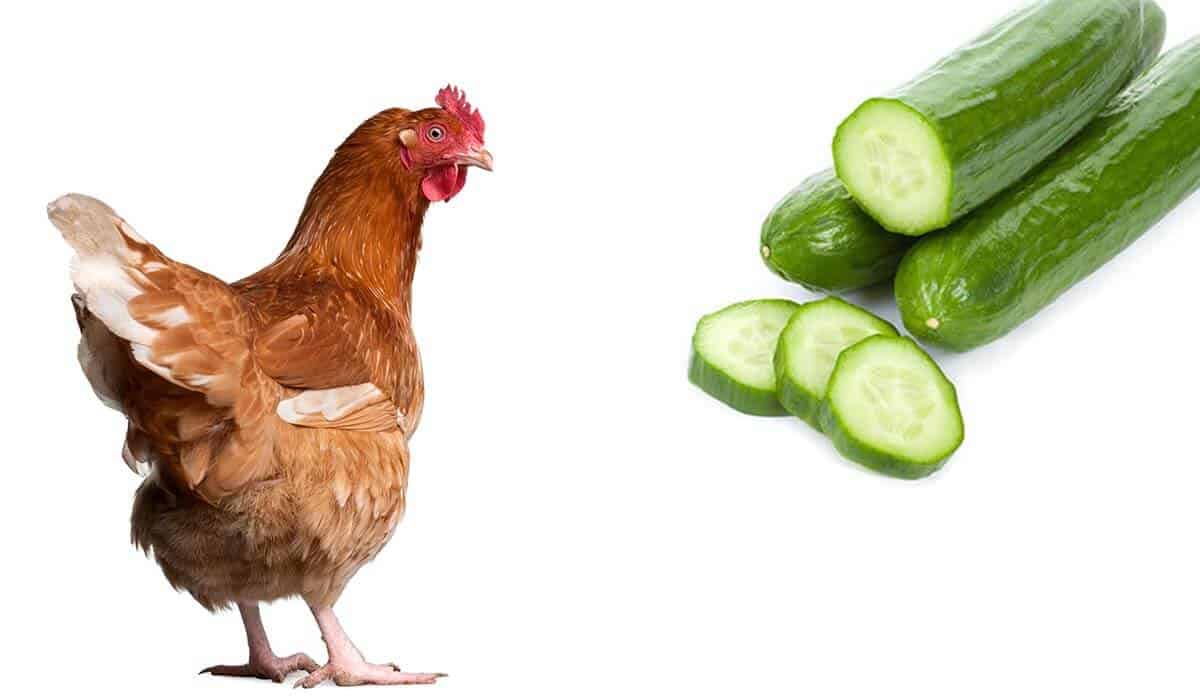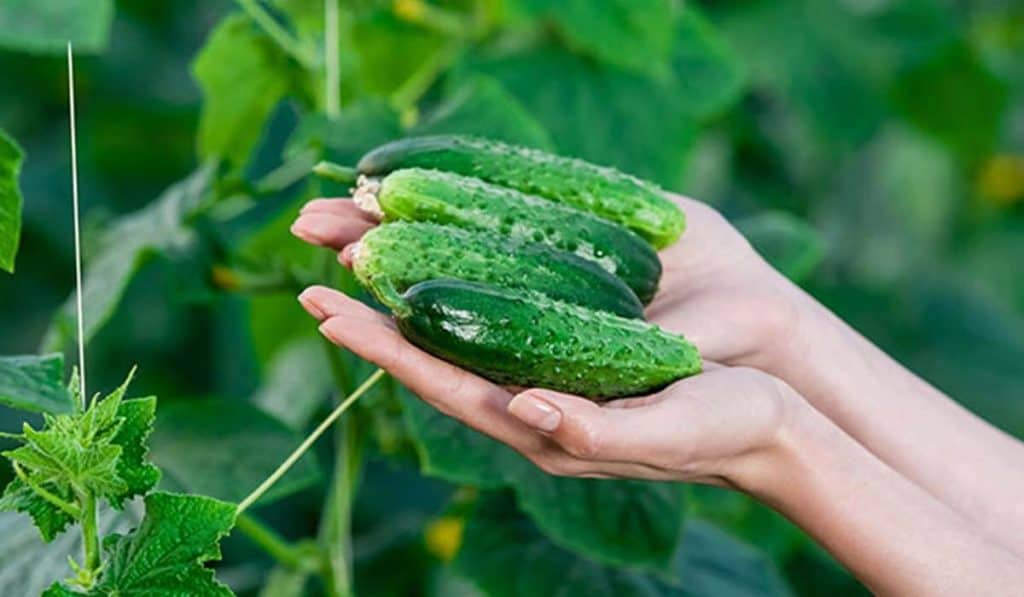If you have a garden then you likely have more cucumbers you know what to do with. We all know that chickens will eat anything, heck, they’ve probably even wandered around in your garden and eaten some of your plants, and vegetables. But is it okay to feed them cucumbers and is it really good for them?
Yes, chickens can eat cucumbers and they love it! Cucumbers are packed with important nutrients and contain about 95% water, which can help keep your chickens hydrated.
We’ll take a look at some of the benefits your flock will receive and the best way to feed them this tasty fruit.

But first let’s take a closer look at the nutrients and vitamins found inside this fruit.
Cucumber Nutritional Information
| Nutrients | Quantity |
| Calories | 7.8 |
| Dietary Fiber | 0.3 grams |
| Betaine | 0.1 mg |
| Vitamin A | 54.6 IU |
| Niacin | 0.1 mg |
| Folate | 3.6 mcg |
| Vitamin C | 1.5 mg |
| Vitamin K | 8.5 mcg |
| Niacin | 0.1 mcg |
| Choline | 3.1 mg |
| Iron | 0.1 mg |
| Selenium | 0.2 mcg |
| Total Omega-3 Fatty Acids | 2.6 mg |
| Total Omega-6 Fatty Acids | 14.6 mg |
| Water | 49.5 grams |
| Phylosterols | 7.3 mg |
| Sugars | 0.9 grams |
(source)
Are Cucumbers Safe for Chickens?
Yes, cucumbers are completely safe for chickens. They will love eating them cold, especially, on a hot, humid day. Cucumbers consist of 95% water, which makes them a healthy snack that will help keep your chickens hydrated.
If you want to give your chickens a fun drink on hot days, consider giving them small amounts of Gatorade.
Benefits of Cucumbers for Chickens
Like us, chickens need certain vitamins and nutrients to live a healthy happy life. Let’s take a closer look at how some of the vitamins and nutrients that are found in a cucumber can help keep your flock happy and healthy.
Vitamin K
Is a fat soluble vitamin that plays a huge role blood clotting, or coagulation, and bone health. Other foods that are high in vitamin K are leafy vegetables such as broccoli, sweet potatoes, turnip greens, lettuce, cabbage, asparagus, and kale.
While it’s true that your chickens will get most of their vitamins and nutrients from their feed, there’s nothing wrong with feeding them healthy fruits and vegetables.
If you believe your flock is not getting the required nutrients in their feed, consult your veterinarian. They will create a diet that will help your flock thrive.
Water
Every living mammal needs water to stay alive. Chickens need access to fresh, clean, water on a daily basis. The amount of water chickens drink daily will vary on several different factors.
While cucumbers shouldn’t take the place of giving your chickens fresh clean water on a daily basis. It can be a great addition to their water intake, especially, when it’s hot and humid outside.
Do Chickens Like Cucumbers?

There isn’t much that a chicken won’t eat. Some ate them quickly while others were more interested in eating their feed.
If you’ve never fed your chickens any type of fruits or vegetables, it will take some time for them to eat them. Like any other animal, chickens are smart and cautious and will investigate the food before eating it.
Can Chickens Eat Raw Cucumbers?
Yes, chickens can eat raw cucumbers. Raw cucumbers with the peel, and seeds. We’ve found it easier to cut it up into small bite size pieces, especially, if you have more than a few chickens.
As soon as you give feed it to them, some of them will grab it and run around the kennel with a piece of the cucumber hanging out of their beak, while the other chickens chase them.
Can Chickens Eat Cooked Cucumber?
Yes, chickens won’t mind eating cooked cucumbers. However, cooking cucumbers automatically reduces the nutritional content. Plus, when you cook a cucumber, it makes it really smooshy, which will make it harder and messier to give it to your chickens.
If you want your chickens to get the most benefits of eating cucumbers, I’d recommend giving it to them raw.
Can Chickens Eat The Cucumber Vines?
Yes, but when mine got into my garden they ate up some of the other plants and didn’t touch the cucumber vines.
That being said, the vines are not toxic to them as long as they don’t have pesticides on them.
Can Chickens Eat All Types of Cucumbers?
Believe it or not, there are over 15 different varieties of cucumbers that are grown all over the world.
Here’s a table of all the different types that are grown.
| Types | Safe |
| English Cucumbers | Yes |
| Green Fingers Persian Cucumbers | Yes |
| Muncher Cucumbers | Yes |
| Ashley Cucumbers | Yes |
| Diva Cucumbers | Yes |
| Sweet Success Cucumbers | Yes |
| Straight Eight Cucumbers | Yes |
| Pickling Cucumbers | Yes |
| Alibi Cucumbers | Yes |
| Double Yield Cucumbers | Yes |
| Liberty Cucumbers | Yes |
| Wautoma Cucumbers | Yes |
| Eureka Cucumbers | Yes |
| Lemon Cucumbers | Yes (does not have a citrus taste) |
| Armenian Cucumbers | Yes |
| Boothby Blondes Cucumbers | Yes |
Based on what I found online, all types of cucumbers are safe to eat and can be fed to your chickens. Whenever feeding your chickens any new types of foods, monitor their behavior.
If you notice any changes, stop feeding them immediately and contact your veterinarian.
How to Feed Chickens Cucumbers?
Wash the cucumber thoroughly to remove any harmful toxins that can harm your chicken. I recommend feeding your chickens organic or cucumbers from your garden, unless you use pesticides.
If you can’t afford to buy organic fruits and vegetables to feed your chickens, make sure you know how to remove pesticides from the fruit or don’t feed it to them.
Once the fruit is thoroughly washed, cut it into small bite size pieces. This will ensure that every chicken and rooster in the kennel has a chance to eat some.
Grab a sturdy bowls and place the pieces inside. Now place the bowls inside the coop and get out of the way.
The chickens will go to work on eating it and you can just sit back and watch.
If you only have a few chickens, just throw a whole cucumber into the kennel and they will peck at it and eat it.
When Not to Feed Chickens Cucumbers?
Even though cucumbers are extremely beneficial for your flock, there are some instances when you shouldn’t feed it to them.
Let’s take a look at some of the reasons:
If The Cucumbers Is Rotten and Moldy
Even though chickens eat anything and everything, you should never feed them food that has gone bad or has mold on it. Mold is bad for them, and can make them sick over time.
If your homegrown cucumbers have been infested by bugs, throw them out. While it’s true that chickens like to eat bugs, they shouldn’t be fed food that is infested with them.
If You Don’t Know Where the Cucumbers Came From?
One of the biggest fears of feeding chickens fruits and vegetables is accidentally poisoning them with pesticides. If you’re not sure what the fruit was exposed to, then don’t feed it to your chickens.
Pesticides are extremely toxic and can kill a flock. If you feel like you need to share them with your chickens, this good saltwater soak has been known to remove the four most common types of pesticides.
When They’ve Had Too Many
Too much of anything, even if it’s healthy can upset your chickens’ tummy. Cucumbers consist of 95% water and feeding them too much can cause them to have diarrhea.
If you have chickens that are laying eggs, you will want to limit the amount of different foods you feed them. Otherwise, it can dilute the nutrition they need to lay eggs consistently.
Other Types of Food That Are Good For Your Chickens
Many chicken owners are always feeding their pets table scraps, fruits, and vegetables. I get it, I mean, who wants to waste food when their pets will eat it?
That being said, every pet owner should know which foods are safe for their chickens and which aren’t. Below you’ll find some foods that will make a great treat for your flock.
- Bananas
- Watermelon
- Asparagus
- Sauerkraut
- Yogurt
Final Word
It’s okay to feed chickens cucumbers, and most will love eating it. Just remember, to limit treats to less than 5% of their diet.
Even though chickens will eat any type of human food, these omnivores will get the nutrition they need when they eat a steady diet that consists of commercial layer feed, and a small amount of “a la carte” treats.
Related Articles
References and Further Reading
Poultry DVM – Vitamin K Deficiency
